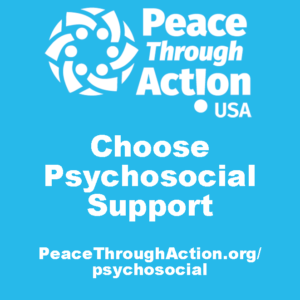What is Psychosocial Support?
The term ‘psychosocial’ refers to the dynamic relationship between the psychological and social dimensions of a person. The psychological dimension includes the internal, emotional and thought processes, feelings and reactions; and the social dimension includes relationships, family and community network, social values and cultural practices. ‘Psychosocial support’ refers to the actions that address both psychological and social needs of individuals, families and communities.[1]
Psychosocial support can help people connect with other family and community members, deal more effectively with personal challenges or practical problems, and can have great benefits in reducing their distress and suffering.[2]
[1] The European Commission. (2017, April). What is psychosocial support? Papyrus. https://papyrus-project.org/what-is-psychosocial-support/
[2] Government of the Netherlands. (2019, September 20). What is mental health and psychosocial support (MHPSS)? Mental Health and Psychosocial Support in Crisis Situations. https://www.government.nl/topics/mhpss/the-need-for-mental-health-and-psychosocial-support-in-crisis-situations/what-is-mental-health-and-psychosocial-support-mhpss#:%7E:text=Mental%20health%20and%20psychosocial%20support%20(MHPSS)%20includes%20any%20support%20that,traumatic%20stress%20disorder%20(PTSD).
How do people learn Psychosocial Support?
Practicing psychosocial support usually depends on the event that occurred or the type and extent of the care that is needed, therefore psychosocial support can take many forms. This can include counseling, education, group support, and spiritual support.
Psychosocial well-being is dependent on the capacity to use resources from these three core domains in response to the challenge of experienced events and conditions: Human capacity, social ecology, and culture and values.[3]
Human capacity involves helping the individual identify their own human capacity by realizing his or her own strengths and values. Social ecology refers to social connections and support, including relationships, social networks, and support systems of the individual and the community. Culture and values refer to cultural norms and behavior that are linked to the value systems in each society and hold immense influence on the psychological wellbeing of the individual. Recognizing and addressing issues within these three core areas contribute to efficient psychosocial support and require understanding how the individual interacts with each category.
[3] The European Commission, Ibid.
How do people implement Psychosocial Support?
Psychosocial support can be completed by the individual as an exercise to recognize their own capability and the support around them, as well as how their community and values contribute to this. However, most often, psychosocial support is completed in groups, usually by a counselor to provide ample support and reassurance to the individual. Practicing psychosocial support within a support-group setting also allows for discussion of the impact of community and cultural norms, as well as creating a visual element of the support around the individual.
For what types of circumstances is Psychosocial Support suited?
Psychosocial support is well suited for developing positive social and emotional behaviors among people who use it. Psychosocial support is also well suited for repairing the long-term harm that results from aggression and violence.
Does Psychosocial Support work for preventing or controlling aggression or violence?
Psychosocial support is a tool commonly used by international institutions such as the UNHCR to provide support to refugees following harsh conditions that put their mental health under significant stress.[4] Other circumstances, including diseases such as cancer, can affect a patient’s thoughts, feelings, moods, beliefs, ways of coping, and relationships with family, friends, and co-workers. [5] Both scenarios imply the existence of unforeseen events that drastically shape an individual’s life and leave feelings of anger and frustration, which can lead to aggression and violence. There are different kinds of psychosocial support that can help different individuals.
The benefit of psychosocial support is that it can be reworked to suit the needs of whichever individual or crisis may call for. In all cases, regardless of the scenario, recognizing one’s own capabilities, seeking support, and understanding cultural context can empower individuals to rise above crises and personal insecurities. Psychosocial support is a tool to be used to prevent aggression but must be paired with the willingness to understand and create meaningful change in one’s life.
[4] United Nations High Commissioner for Refugees. (2015). Mental Health and Psychosocial Support. UNHCR. https://www.unhcr.org/en-us/mental-health-psychosocial-support.html
[5] NCI Dictionary of Cancer Terms. (2012). National Cancer Institute. https://www.cancer.gov/publications/dictionaries/cancer-terms/def/psychosocial-support
Where else might I go to learn more about Psychosocial Support?
- The European Commission (Papyrus)— What is psychosocial support?
- UNHCR— Mental Health and Psychosocial Support
- UNICEF— Mental health and psychosocial support in emergencies
- USAID— Mental Health and Psychosocial Support
Information Sheet-Choose-Psychosocial Support (PDF)
Have a suggested improvement to this information sheet? Send it to inbox@peacethroughaction.org
Do Something Right Away to Increase Peace
Subscribe to our YouTube channel
Give a gift of money to support our mission delivery activities
Choose opportunities to take part in our #PeaceBeginsWithWe campaign

